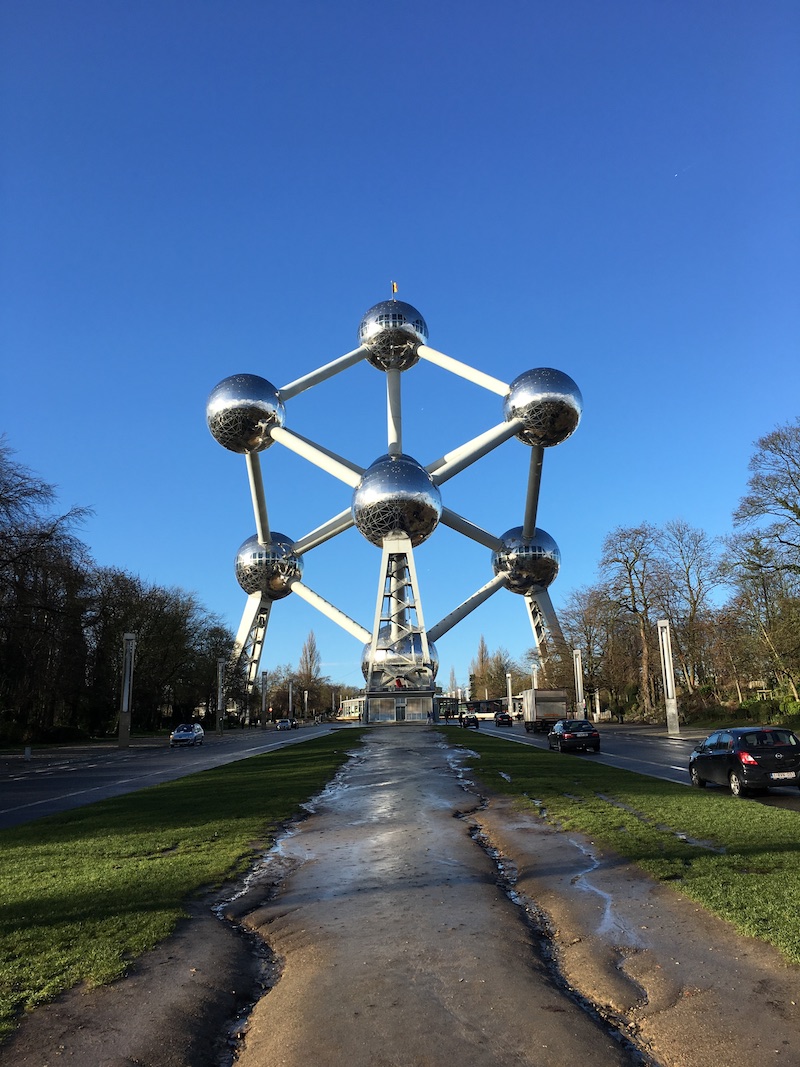Well, it’s February again and this means that it was once again time for hopping onto a plane and heading to Brussels for this year’s edition of FOSDEM. Sadly, this time the weather wasn’t as welcoming as last year’s. I wanted to do the usual tour visiting the main square and the Atomium for my girlfriend but we ended up soaked thanks to heavy rain and then nearly frozen thanks to two hail-storms in quick succession.
Oh, and the panorama sphere of the Atomium was closed for renovation. At least we got a discount and nice weather afterwards 😁

On the way there we also had some delicious hot chocolate at Frederic Blondeel. Unfortunately, the chocolate shop wasn’t as nice as the products it offered. Honestly, not even at Grand Central station in New York, which previously held the price for most f*cked-up toilet, have I seen a messed up restroom like this.
After some warming up (again) and some sleep it was time for the first “official” FOSDEM event: The Friday Evening Party at Delirium Café! We had already met some friends at the airport and decided to join forces at the party and later on also grab something to eat. Simply a great evening with definitely too much alcohol and too little wit 😥
And … probably also too little 😴 later - and skipping the first couple of talks - we finally made our way down to the ULB and … get our very first waffles 😁 (No time was wasted on documenting them using a picture, in case you’re wondering.) Before I go on talking about all the beer and waffles and fries I’ve had over the weekend, I should probably also write something about FOSDEM itself, shouldn’t I?!
Same as last year on Saturday I tried to get into the Go devroom. After a bit of waiting I succeeded and managed to attend the following talks:
- Upspin and a future of the Internet by Gildas Chabot
- Dep deep dive! by Sam Boyer
- Networking Swiss Army Knife for Go by Roman Mohr
- The case for interface{} by Sam Whited
- Google’s approach to distributed systems observability for Go by Jaana Dogan
Out of these I was probably fascinated the most by Upspin. That project had been on my to-check-out list for quite some time but I never managed to find the time. This talk gave be a quick summary that completely renewed my interest. The time-problem remains, though.
A bit more applicable to work is what Google is building with OpenCensus. It pretty much combines something similar to OpenTracing with a unified interface for metrics, logging, et al.
Afterwards we tried to get into the security track together, but sadly some people started pushing their way through and failed. Luckily, we found a nice, quiet spot in the library with power, WiFi and soda.
Next morning I decided I want to learn more about Rust. While Go is my primary language for now, situations might arise where I have to extend Python or JavaScript code with high-performant, multi-threaded logic. Since it seems like cross-compiling is now easier, I really want to get to know Rust more! To get a quick-start, I attended the following talks:
- Why you should take a look at Rust? by Antonin Carette
- Idiomatic Rust by Matthias Endler
- Rust memory management by Zeeshan Ali
Later we managed to get into the privacy track and learnt about PrivacyScore.org, which provides a single score for how many trackers and other privacy issues a site has. Nice!
Before it was time to go home, it was time for the closing keynotes by Jon Masters about Meltdown, Spectre, and what the industry was doing to detect and prevent such issues in the future.
An awesome dinner at Émile Bistro and some shopping at the local Uniqlo and chocolate store we were once again on the trip back home. I’m really looking forward to next year’s FOSDEM already!

Do you want to give me feedback about this article in private? Please send it to comments@zerokspot.com.
Alternatively, this website also supports Webmentions. If you write a post on a blog that supports this technique, I should get notified about your link 🙂